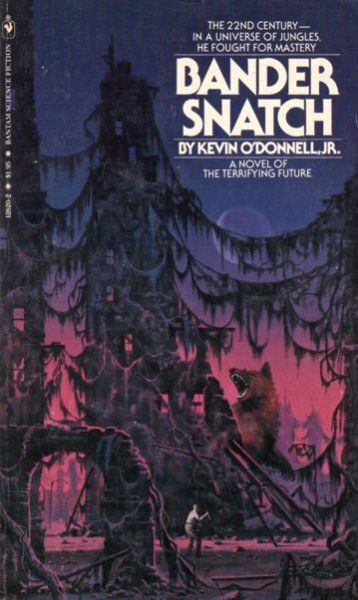All Driving Rocket Ships
Bander Snatch
By Kevin O'Donnell, Jr.

17 Oct, 2021
1979’s Bander Snatch was Kevin O’Donnell, Jr.’s debut science fiction novel.
Thanks to off-world resources, 22ndcentury Earth is a paradise … mostly. Most folks in this semiperfect society live in no-coms, small communities that are marvels of conformity and uniformity. There are few opportunities for social friction between dissimilar groups. There has been nothing like a proper war since 2063.
No-coms have no place for misfits. The tiny fraction of people unable to adapt to modern life are consigned to places like Federal Dependents Resettlement Area Number Three. If they are particularly unlucky, they may end up in the ruins of Townships 19, 20, 24, and 25, which are still largely unreconstructed after the food riots of 2128. Thanks to agreements that made sense back in 2128, they are still under the control of what are perhaps best called war lords.
Twenty-two-year-old Bander Snatch is one such war lord.
Bander has to keep a lot of balls in the air. He needs to keep his underlings intimidated enough to obey him, but without convincing them that they’d be safer with him dead. He needs to defend his territory against rival gang lords. He needs to convince the federal bureaucrats who control the flow of supplies into FDRA 3 to limit their skimming to a sustainable level. Bander is good at his job but he is very unlikely to die of old age.
Bander’s first inkling that powers outside FDRA 3 have taken an interest in him comes when his lover Shana is covertly detained by federal agents. This is a ruse to draw Bander out of the slums to the Lomala Research Institute. Despite the methods used, the motivation behind Shana’s detention is benign, at least from the perspective of society in general. Bander is going to help to save the world.
The problem with the current setup is two-fold. First: things work well enough that there is no impetus for reform. Second: because most people never encounter people unlike themselves, the skills needed to manage conflicts between dissimilar groups are vanishing. Provided he can be convinced to cooperate, Bander has useful skills that are otherwise rare in the 22nd Century.
Bander also has paranormal powers. He is a telepath. His potentially useful powers are undeveloped and Earth lacks psychic adepts to serve as his mentors. Luckily, superluminal flight means alien contact is a routine occurrence. Arkslsnagl’s telepathic natives are intrigued by the idea of training humans. Bander has but to agree and the aliens will hone Bander’s psychic talents.
Perhaps Bander will master telepathy. Perhaps he will die trying. Perhaps he will end up tanned and made into boots by disapproving aliens.
~oOo~
The idea that people from the periphery of civilization may have skills the civilized lack is nothing new, of course. In our own history, warlike nomads have often conquered defenseless peasantry. SF and fantasy authors have used this trope in too many novels to list here. In such works, the conquering barbarians usually come from the outskirts, or from isolated worlds. They don’t hail from slums. This is because generally speaking SF, and in particular SF of the late 1970s, hated cities.
Urban hellscapes are a recurring feature in SF. Generally, this is because their inhabitants are seen as irredeemable monsters, incapable of mastering civilized arts. Sometimes it is because the author views cities themselves as inherently corrupting. Bander Snatch provides an exception to those patterns.
In the case of FDRA 3, the slum serves as an oubliette for the mentally ill, the illiterate, and the variously damaged. The issue isn’t that these people are beyond help, but that their society prefers not to help them. It would also prefer not to acknowledge the very existence of such outcasts. It feeds them … minimally. It’s too damn easy for bureaucrats to siphon off some of the aid (a practice well known to First Nations and Native American peoples) [1].
The novel’s wheels come off once Bander returns to Earth to become an ombudsman. It’s a position that does not require awesome telepathic powers. Indeed, the entire subplot about travelling to Arkslsnagl for training is irrelevant to the tasks for which the semiperfect society needs Bander. The author seems to have sensed this, because there’s a contrived crisis involving another psychic warlord. Bander Snatch is trying to be two entirely different novels at once and doing so unsuccessfully.
Ah, well. Everyone has to start somewhere. O’Donnell’s later books were more interesting.
This is where I expected to say, “Bander Snatch is long out of print.” It happens that by pure coincidence I stumbled over my MMPB of the novel just after it was reprinted.
Bander Snatch is available here (Amazon US), here (Amazon Canada), here (Amazon UK), here (Barnes & Noble), here (Book Depository), and here (Chapters-Indigo).
1: As it turns out, in this setting the heavily armed outcasts do set a limit on bureaucratic corruption. The bureaucrats can only steal so much before they are killed by their clients. At least one too-greedy official is tried, convicted, and executed by an ad-hoc court in the course of the narrative.
